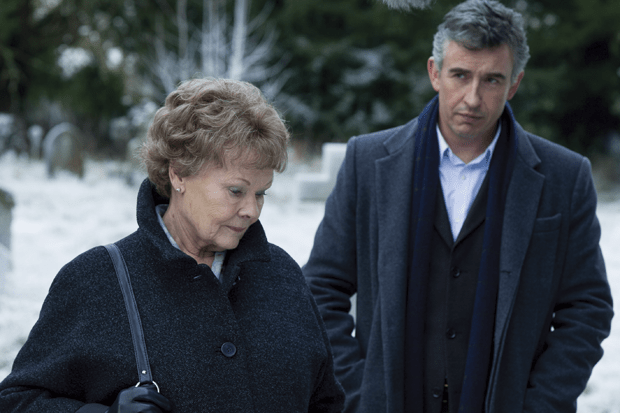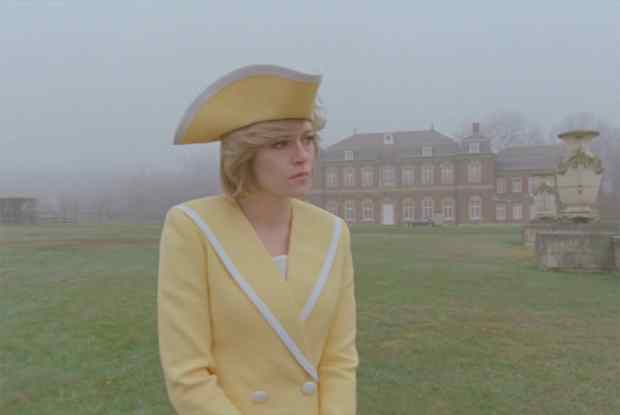Philomena is based on the true story of an Irish woman searching for the son stolen from her by the Catholic Church 50 years earlier, and although, as a cinematic experience, it could so easily have felt as if you were being repeatedly slapped round the head by a copy of Woman’s Own, it is, thankfully, quite a few notches up from that. Indeed, as directed by Stephen Frears, it is quiet, restrained, unfussy, and has, at its heart, an injustice so grave it will make your blood boil. You will also cry. Seven minutes in, and I was already crying. Not proud, but it is a fact.
Dame Judi Dench stars as Philomena, which is, of course, beyond wonderful, as any film starring Dame Judi Dench will be highly watchable, whatever. She could make a film about the best way to zap warts, and I’d still be all over it. Also, she’s in every scene, more or less, and it’s just so fantastic to see an older woman’s face take centre stage, and a proper older woman’s face at that. (I saw Cher on Graham Norton’s show the other night and it’s as if she’s been clingfilmed.)She stars with Steve Coogan, who also co-wrote the script. Probably, I wouldn’t be all over any film Coogan made about warts, but he is rather suited to playing Martin Sixsmith, the journalist and spin doctor who wrote the book on which this is based, and who helped Philomena with her search.
The film’s immediate opening is comic in tone. We see Martin undergoing a medical. ‘Your stool is outstanding,’ says the doctor. ‘Really?’ says Sixsmith, looking all pleased. ‘You haven’t provided a sample yet,’ the doctor explains. Martin isn’t, in fact, in such great shape. He’s just lost his job with New Labour due to the ‘bury bad news’ emails. He needs something to do; a purpose. He needs rescuing as much as anybody, we are given to understand, a little heavy-handedly. But when he’s first told about Philomena, by her grown-up daughter, he is dismissive. ‘It’s a human-interest story and I don’t do human-interest stories,’ he says. (When I worked in women’s magazines, this type of human-interest story was known as a ‘womb-trembler’; not proud of that either, but it’s also a fact.) Ultimately, he is cajoled into it, and the film becomes a kind of odd couple road movie, but with heft.
Sixsmith and Philomena are not suited, on the face of it. He is a metropolitan and sophisticated. She is not, and much is made of her cultural and intellectual limitations, particularly her wonder at the modern world — the ride-on trolleys at the airport bring on childlike excitement — and her insistence on recounting the plot of every Mills & Boon she has read. Sixsmith despairs, calls his wife, and says, ‘I now know what a lifetime of the Daily Mail and Reader’s Digest and romantic fiction does to someone’s brain.’ But will he come round to respecting her? To embracing her, even? Come on. Is the ruddy Pope Catholic?
Philomena is patronised here, as older women often are, but it may have been necessary to make this work dramatically, and her yarn is such a whopper of a yarn, perhaps the most important thing was simply to put this yarn out there. Her story is told in flashbacks, and goes like this: knocked up by a young lad at a fairground in Ireland in the early 1950s — she loved the sex; ‘I felt like I was floating, Martin’ — she was dispatched to an unwed mother’s facility run by nuns. Here, she gave birth with no pain relief, even though it was breach. (‘The pain is her penance,’ spat Sister Hildegard, who will have quite a lot to answer for.) Philomena is indentured to the convent, slaving away in the laundry, but allowed to see her son, Anthony, for an hour a day until he is three and a half years old, when suddenly he is taken away. As an adult, she has returned to the convent repeatedly, in an attempt to find her son, but the nuns have always said the documentation was destroyed in a fire. The sheer venality of the nuns should make your blood boil, and will.
Anything I say from here on in takes us into spoiler territory, so I’ll say only what’s been widely disseminated already; that the nuns sold Anthony to a wealthy American childless couple. So the search takes the pair to Washington, where she worries Anthony will be obese ‘because of the portion sizes, Martin’. They find what they are looking for even though, interestingly, it is not what you expect them to find, and there is no pat happy ending. However, there is anger. Not from Philomena, whose faith remains unshakable, but from Sixsmith, who lashes out most satisfyingly. (Sister Hildegard, you had it coming.)
Coogan is good, actually; not too Partridgey, or pouty-mouthed, plus he brings an awkward gravity to Sixsmith, but it’s Dame Judi’s film, and rightly. She invests Philomena with warmth and tenderness and a pain that is never overly sentimental. And I cried. Not proud, but did.
Got something to add? Join the discussion and comment below.
Get 10 issues for just $10
Subscribe to The Spectator Australia today for the next 10 magazine issues, plus full online access, for just $10.
You might disagree with half of it, but you’ll enjoy reading all of it. Try your first month for free, then just $2 a week for the remainder of your first year.














Comments
Don't miss out
Join the conversation with other Spectator Australia readers. Subscribe to leave a comment.
SUBSCRIBEAlready a subscriber? Log in